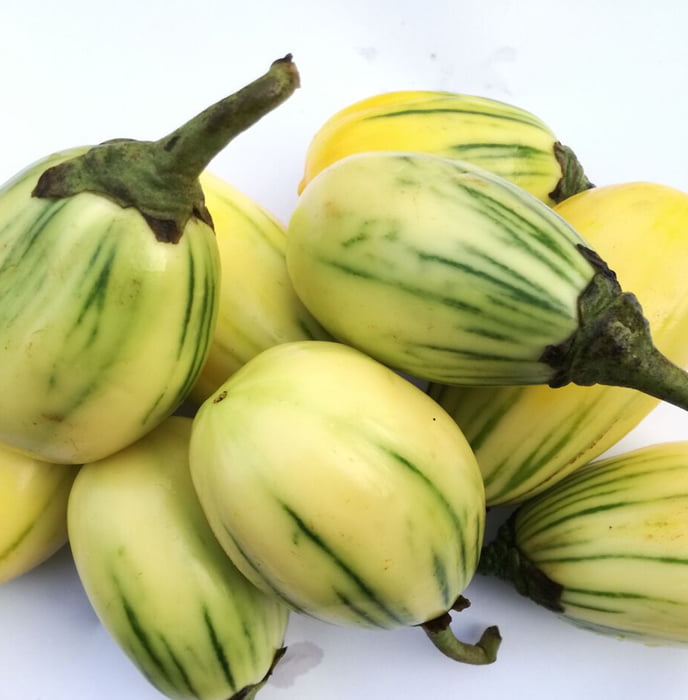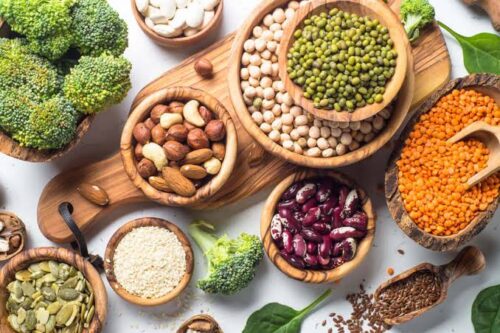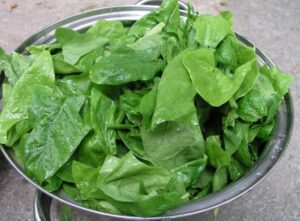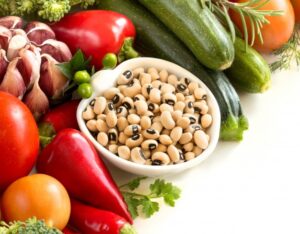Dietary fiber-rich foods will help you treat constipation, prevent colon cancer, and strengthen your digestive tract.
Studies have shown that Africans living in rural areas hardly suffer from any digestive tract diseases because their diets are mostly whole grains that are rich in fiber. [1]
A high-fiber diet also promotes weight loss and lowers blood sugar levels. [2]
The recommended daily intake of fiber according to the Academy of Nutrition and Dietetics is 25 grams for women and 38 grams for men. [3]
However, in most Western cultures, adults and children get only about 10-15 grams of fiber from the Western diet which is usually high in sugar and unhealthy carbs.
To correct this, start by incorporating whole grains, legumes, fruits, and vegetables into your diet.
What is dietary fiber?
Dietary fiber also called roughage or bulk is a type of carbohydrate that is not easily digested by the body.
There are two major types of fiber – soluble and insoluble fiber.
Foods rich in soluble fiber (e.g. oat) digest easily in the stomach to form a gel-like bulk that helps lower cholesterol while foods rich in insoluble fiber (e.g. whole wheat) add bulk to your stool and help prevent constipation.
They are both important and provide your body with the following health benefits:
- Prevents heart disease: Dietary fiber may help prevent heart disease by helping to reduce the body’s blood cholesterol absorption.
- Promotes weight loss: Foods that are high in fiber tend to be low in calories. The fiber slows the speed with which food passes from the stomach to the rest of the digestive system – thus making you feel full for longer periods.
- Prevents diabetes: Because fiber slows down how quickly food is broken down, it may help control blood sugar levels for people with diabetes by reducing blood sugar levels after meals.
- Prevents constipation and colon cancer: Fiber makes bowel movements easy and helps prevent excessive straining that may cause hemorrhoids.
African foods high in dietary fiber
1. Legumes
Legumes like lentils, cowpeas, chickpeas, pigeon peas, green beans, etc. are highly nutritious, cheap, and high in dietary fiber.
Some of these beans contain pectin, a form of soluble fiber that becomes gummy-like in water. This can delay stomach emptying, make you feel full longer, and prevent blood sugar spikes.
Also, beans are high in protein, vitamins, and minerals. When properly prepared, they’re among the world’s cheapest sources of quality nutrition.
You can cook and add beans to your salads, porridge, or soups. They are incredibly tasty.
Fiber content: 100 grams of lentils and chickpeas contain about 7.3 grams and 7.6 grams of soluble fiber respectively.[4], [5]
Related: 10 amazing health benefits of Cowpeas (Black-eyed peas)
2. Whole wheat meal/bread
Whole wheat bread or meal contains the endosperm, germ, and bran in contrast to refined white flour that contains only the endosperm (starchy part) – making it high in insoluble fiber.
Whole grain wheat is high in protein, B vitamins, and minerals.
Since Africans love to pound and swallow their foods, you can use whole wheat meal to make swallow fufu and eat it with soups.
Another option is to make whole wheat bread, as they are tasty and easy to prepare.
Fiber content: 100 grams of whole wheat flour will provide you with about 10 grams of fiber. [6]
3. Popcorn
Popcorn is a special type of corn that pops when exposed to heat and is one of the best sources of dietary fiber.
It is an excellent example of African foods high in dietary fiber. Popcorn is rich in antioxidants, vitamins, minerals, and fiber.
You can roast it, boil it, or pop it and eat it as a snack.
However, be careful not to increase your calorie intake by adding too much butter and sugar when preparing it.
Fiber content: 100 grams of air-popped popcorn will provide you with about 14 grams of insoluble fiber.
4. Oats
Oats are incredibly rich in dietary fiber.
They are nutritious with a high fiber content that will keep you full for longer periods.
Also, they contain beta-glucan, a form of soluble fiber that reduces LDL (bad) cholesterol and improves blood sugar control. [8]
You can use them to make breakfast cereals, bread, or biscuits.
Fiber content: 1 cup (81g) of raw rolled oats contains about 9 grams of fiber [9]
5. Teff
Teff is a wonderful African food high in dietary fiber. The fiber content in Teff is higher than in most whole-grain cereals. It is rich in protein, vitamins, and minerals.
You can use it to make a local Ethiopian flatbread called ”injera”.
Fiber content: 100 grams of raw teff grain contains about 11 grams of insoluble fiber.
Other high-fiber grains include
- Guinea corn (sorghum): 12 grams in 1 cup (192 g)
- Pearl millet: 11 grams per 100 grams
- Amaranth: 6.7 grams per 100 grams.
- Fonio (Acha): 3 grams per 100 grams
- Quinoa: 2.8 grams per 100 grams
All values are given for raw whole grains.
6. Avocado
The avocado is a unique fruit. Instead of being high in carbs, it’s loaded with healthy fats.
Avocados are very high in fiber, vitamin C, potassium, magnesium, vitamin E, and B vitamins. They also have numerous health benefits.
You can eat them as guacamole, slices on bread, or blend it with other fruits to make a smoothie.
Fiber content: 100 grams of avocado will provide you with about 7 grams of soluble fiber. [11]
7. Banana
Bananas are incredibly healthy and nutritious.
They are rich in fiber, vitamin C, vitamin B6, and potassium.
A green or unripe banana also contains a significant amount of resistant starch, a type of indigestible carbohydrate that functions like fiber.
You can add them to smoothies or enjoy them with roasted peanuts.
Fiber content: 1 medium banana (118 grams) will provide you with about 3 grams of soluble fiber.[12]
8. African star apple

Commonly called udara or agbalumo is a sweet nutrient-dense fruit.
Its pulpy part is rich in vitamin C, vitamin A, vitamin E, calcium, phosphorus, zinc, potassium, and fiber.
And it can be enjoyed as a snack by everyone including pregnant women and people with high blood pressure.
Fiber content: 100 grams of Udara contains about 4 grams of soluble fiber. [13]
Related: 50 African foods for quick weight loss
9. Baobab fruit
The baobab tree is common in East and South Africa. The fruit is used as food for both humans and animals in these areas.
The baobab fruit is a fiber powerhouse, containing 10 times more fiber than apples. It is also high in antioxidants, potassium, magnesium, and iron.
Also, the dried baobab fruits are ground into powder form and sold online or in markets around Africa.
You can boil the fruits to make ice cream, or you can add the powdered baobab to juices or smoothies.
Fiber content: 100 grams of baobab powder will provide you with a whopping 44 grams of soluble fiber. [14]
10. Garden eggs

Also called Ethiopian eggplant is an exceedingly healthy fruit.
It has different varieties, and they are all rich in dietary fiber and packed with vitamins and minerals.
You can eat them as a snack with peanuts, add them to salads, or make a pork stir fry.
Fiber content: 100 grams of fresh garden eggs will provide you with about 3 grams of fiber.
11. Leafy green vegetables
The native African diet is rich in green veggies like fluted pumpkin leaves (ugu), cowpea leaves, spinach, amaranth leaves, okra, cassava leaves, etc.
These veggies are packed with so many nutrients, rich in dietary fiber, aid digestion, and prevent constipation.
They are often added to soups, stews, or even salads.
Fiber content: 100 grams of African leafy greens contain about 3 grams of dietary fiber.
Other high-fiber vegetables include:
- Carrots: 2.8 grams per 100 grams
- Beets: 2.8 grams per 100 grams
- Tomato: 1.2 grams per 100 grams
12. Peanuts
Peanuts commonly called groundnuts are incredibly healthy legumes.
They are rich in protein, fats, manganese, magnesium, phosphorus, and dietary fiber.
You can eat them as peanut butter, or roasted snacks, or sprinkle them on desserts.
Fiber content: 100 grams of roasted peanuts contain about 9 grams of soluble fiber. [15]
13. Tiger nuts
Tiger nut is a wonderful tuber crop that is incredibly healthy and nutritious.
It has a rich content of insoluble fiber that helps to promote digestion, prevents constipation, and keeps you full for longer periods.
It is also rich in phosphorus, vitamin C, and iron.
You can eat the dried or fresh nuts as snacks, grind the fresh nuts and make a drink, or grind the dry nuts and use them in baking.
Fiber Content: 100 grams of fresh nuts will provide you with 13 grams of insoluble fiber. [16]
14. Sweet potato
The sweet potato is a popular tuber that’s very filling and has a delicious sweet flavor.
It is high in fiber, carbs, Vitamin A, B vitamins, and minerals.
You can boil it with the back for more fiber and eat it with tomato sauce or mash it and serve with roasted veggies, either way, sweet potatoes are always tasty.
Fiber content: A medium-sized (150 grams) boiled sweet potato (without skin) will provide you with about 3.6 grams of fiber [17]
15. Yam
Yams are a good example of an African food high in dietary fiber.
They are incredibly nutrient-dense and contain more dietary fiber than sweet potatoes.
Yams are healthy, delicious, and easy to prepare.
You can use yams to make porridge, add it to beans, or boil it and eat it with stew.
Fiber content: 1 cup (150 grams) of cubed raw yam contains about 6 grams of dietary fiber. [18]
Tips to add African foods high in dietary foods to your diet.
- Mix in oats, sorghum, or fonio to meatloaf, bread, or other baked goods.
- Toss beans into your next salad or soup.
- Chop up veggies to add to your soup, stews, sandwiches, pasta, or stir-fry.
- Blend fruits into a smoothie or use it to top cereal, pancakes, or desserts.
- Drink plenty of clean water.
Bottom line
Although whole grains and beans tend to be higher in fiber than fruits and vegetables, make sure to include a variety of foods in your daily diet to give you other nutrients.
Also note that a sudden increase in fiber intake may cause rumbling, intestinal gas, and even some cramping, so start in small amounts.
Then increase intake as tolerance is acquired. The goal should be 20 to 35 grams of fiber a day.
Get new free and exclusive health tips delivered straight to your inbox!



